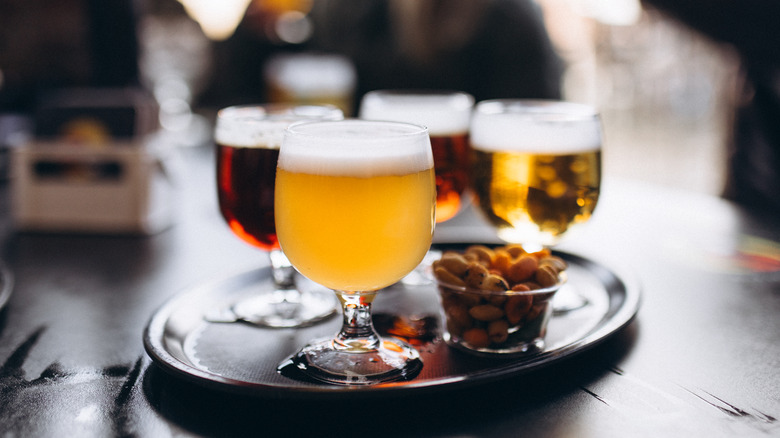Drinking Beer Has A Little-Known Effect On Your Cholesterol
If your doctor tells you that you have high cholesterol, it can be frustrating thinking of how your cholesterol bumped to unhealthy levels. You can lower your cholesterol without medication by reducing foods high in saturated fats and eating more healthy fats found in salmon, nuts, and seeds. Soluble fiber in foods like oatmeal, beans, and apples lowers how much cholesterol is absorbed into your body. You'll also need to lose some weight, get a little more exercise, and quit smoking.
Even though beer doesn't have fat, it can also affect your cholesterol. According to a 2020 study in Nutrients, moderate alcohol consumption is linked to higher HDL (good) cholesterol by reducing the activity of a protein that moves HDL cholesterol to LDL cholesterol. However, that doesn't mean you should be drinking more beer. Heavy alcohol drinkers tend to have high triglycerides because alcohol also interferes with the body's ability to break down fat. In other words, the amount of beer you drink can be good or bad for your cholesterol levels.
How much alcohol affects your cholesterol
Moderate drinking is considered to be two drinks or less a day for men and one drink for women. This can be confusing, especially since alcohol content can range from 3.2% to more than 9% in today's craft brews. The Centers for Disease Control and Prevention (CDC) considers a standard beer to be 12 ounces with 5% alcohol. You could easily exceed that if you get a pint, which is 16 ounces, and the beer is a heavy IPA.
Alcohol has a J-shaped relationship with your cholesterol, which means light-to-moderate beer drinking has either a positive or little effect on your cholesterol, but drinking more than that escalates the negative effect of your cholesterol.
Although moderate drinking can elevate your HDL cholesterol, you might find that HDL cholesterol wanes the longer you drink. A 2022 article in the International Journal of Molecular Sciences found that even moderate drinkers who drank for 10 years had 13% lower levels of HDL compared to non-drinkers. Moderate drinkers also had higher levels of triglycerides.
Too much beer isn't great for your overall health
You could have healthy cholesterol levels, but cholesterol is just one factor in your overall health. Red wine might have antioxidant properties, but beer is linked to inflammation in your body that can lead to chronic disease, according to a 2020 study in Nutrients. Drinking too much beer can also increase your risk of high blood pressure, especially in men. A beer per day might lower your risk of type 2 diabetes by 53%, but drinking more than that raises your risk.
Fermented foods feed the bacteria in your gut to improve your physical and mental health. Beer is also fermented. A 2020 study in Molecules found that moderate beer drinkers had more bacteria that produce butyric acid, which reduces inflammation and promotes digestive health. However, too much beer raises your risk of cancers of the mouth, esophagus, colon, liver, larynx, and breast, according to a 2015 meta-analysis in the British Journal of Cancer.
According to the CDC, previous research about the beneficial effects of moderate alcohol consumption is now being reevaluated, suggesting that drinking no alcohol is best. If you choose to drink, remember that moderate alcohol consumption doesn't mean banking your drinks until the weekend. According to the National Institute on Alcohol Abuse and Alcoholism, binge drinking is considered drinking five or more drinks in two hours for men and four or more drinks for women.


